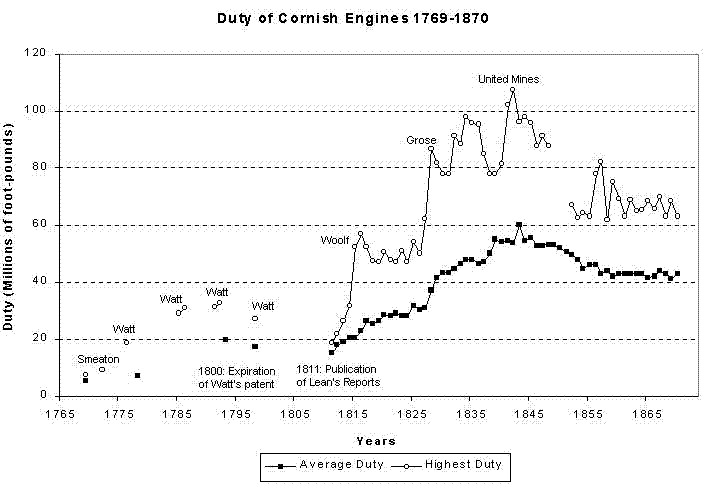Cornish Steam Engine
Jump to navigation
Jump to search
- Open innovation at the beginning of time: http://www3.sympatico.ca/karasik/counter_example_to_s_curve.html
- http://www.fee.org/the_freeman/detail/do-patents-encourage-or-hinder-innovation-the-case-of-the-steam-engine/#axzz2OwkGZN4f
- On publishing: This situation lasted until 1811, when a group of mine captains decided to begin the publication of a monthly journal reporting the relevant technical characteristics, the operating procedures, and the performance of each engine. Their explicit intention was twofold. First, the publication of the reports permitted the rapid individuation and diffusion of best-practice techniques. Second, it introduced a climate of competition among the engineers entrusted with the different pumping engines, with favorable effects on the rate of technical progress. Joel Lean, a highly respected mine captain, was appointed as the first engine reporter. The journal would later be called Lean’s Engine Reporter. During the 31 years after 1811 this collaborative competitive effort at innovation raised duty by more than the great “breakthrough” of Watt ever did.
Compelling Notes
- From 1786 to 1800, a period of monopoly on the steam engine was essentially complete as Watt actively prevented others from developing improvements. As a result, there was 0 gain in the efficiency of steam engines in that period
- Expiry of Watt patent in 1800 - financial relief from not paying premiums on steam engines due to the patent made Cornish miners complacent, until publication of Lean's Reporter in 1811 - a publication encouraging rapid individuation and diffusion of best practices
- 3.5 years it took Watt to patent were rewarded with 31 years of monopoly
- Downside: reward to success bears no relation to the cost of invention
- On Trevithick: During the 31 years after 1811 this collaborative competitive effort at innovation raised duty by more than the great “breakthrough” of Watt ever did.
- Like with open-source software, altruism and socialism played no role—just good old-fashioned capitalist incentives. Engineers were recruited by captains of the mine on a one-off basis to build and design an engine... Thus the publication of technical information concerning the design and performance of different steam engines permitted the best engineers to consolidate their reputation and improve their career prospects. Over time, this practice gave rise to a professional ethos favoring sharing and publication of previous experiences.
- From 1781 to 1852 Cornish residents took out a grand total of 15 patents on steam technology—against 994 patents on steam technology in all of England during that period. Will it surprise you to learn that the area with the fewest patents also was the area that contributed the most to the innovation and development of steam technology?
